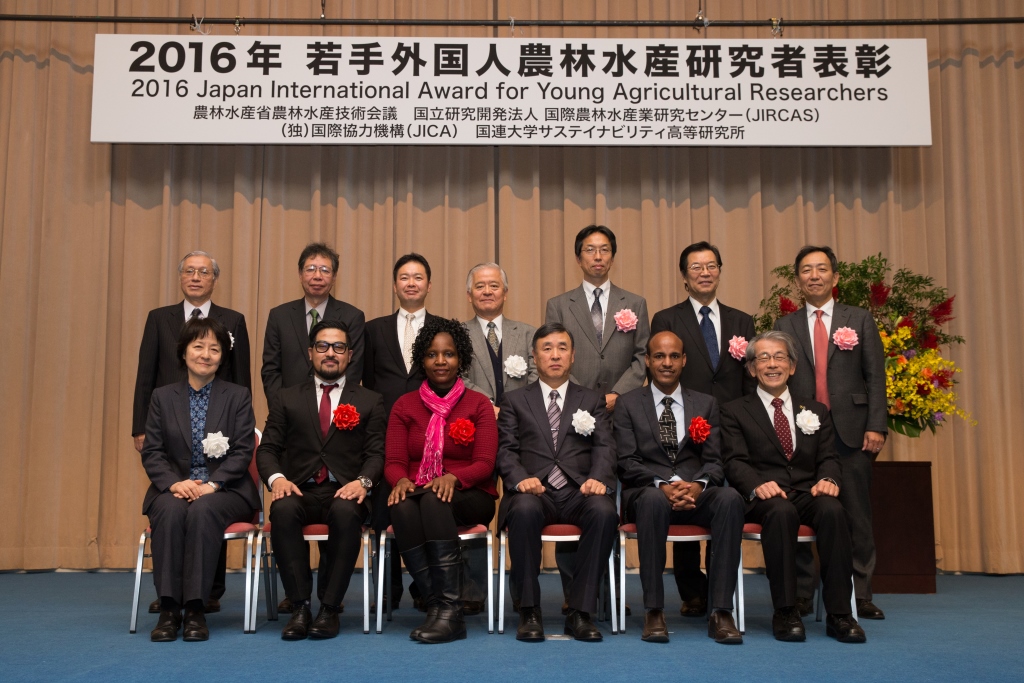JIRCAS, in cooperation with the Agriculture, Forestry and Fisheries Research Council (AFFRC) Secretariat, presented the Japan International Award for Young Agricultural Researchers for the tenth consecutive year. The award recognizes and honors young foreign researchers (under 40 years of age) who are highly recommended by their institutes, and whose outstanding achievements promote research and development of agricultural, forestry, fishery and other related industries in developing regions. The 2016 commendation ceremony was held last December 1 at the U Thant International Conference Hall, United Nations University (UNU) in Tokyo.
The awardees and guests were welcomed by Mr. Yoshio Kobayashi, chairman of the AFFRC. Congratulatory remarks were delivered by Mr. Hiroshi Chishima, director for Industrial Technology and Nanotechnology, Bureau of Science, Technology and Innovation, Cabinet Office; Dr. Kazuhiko Takemoto, director of the UNU Institute for the Advanced Study of Sustainability; and Mr. Hiroto Mitsugi, director general of the Rural Development Department, Japan International Cooperation Agency (JICA). The selection process was explained by Dr. Mutsuo Iwamoto, chairperson of the Selection Committee. Mr. Kobayashi and Dr. Masa Iwanaga, president of JIRCAS, presented the prizes.
The selection process was conducted by a seven-member selection committee through a document review, with the chairman of the AFFRC determining three winners from among 25 candidates. Each awardee received a testimonial and a monetary prize of 5,000 US dollars.
Production of vermicompost and vermiwash bio-fertilizers from food waste
Awardee: Dr. Musaida Mercy MANYUCHI
Harare Institute of Technology, Republic of Zimbabwe
Outline of Research Achievements
Food and agricultural waste is being generated in huge quantities and in most cases are being left to rot, resulting in increased greenhouse gas emissions. However, these food wastes have the potential to be vermicomposted to produce biofertilizers in solid (vermicompost) and liquid form (vermiwash). During vermicomposting, the earthworms feed on the food waste and excrete them as fertilizers.
Novel approaches for the improvement of yam germplasm conservation and breeding
Awardee: Dr. Gezahegn Girma TESSEMA
International Institute of Tropical Agriculture (IITA), Federal Democratic Republic of Ethiopia
Outline of Research Achievements
Regardless of the huge benefit yam is offering to humankind and its wide distribution and cultivation, the crop has been neglected and treated as an orphan crop. Evidently, minimal efforts have been done to support conventional taxonomic identification to understand the taxonomy of yam. Moreover, the extent of genetic diversity has not been well investigated. In addition, very little is known regarding which genes are responsible for key traits in yams and there is almost no report on polyploidy and its effect on phenotypic performance.
The research achievements addressing these gaps include the establishment of a DNA barcoding system that supports conventional taxonomic identification, understanding the extent of genetic diversity among cultivated guinea yams and wild relatives based on next-generation sequencing based genotyping techniques, understanding the effect of polyploidy on aerial tuber production, and the discovery of novel candidate genes implicated in flowering and sex determination.
Precision food processing: Establishment of mathematical models for microbiological and physicochemical food properties for food safety, food defense, and food quality outline of research achievements
Awardee: Dr. Alonzo Alulod GABRIEL
University of the Philippines Diliman, Republic of the Philippines
Outline of Research Achievements
The application of traditional yet effective and affordable thermal pasteurization process to thermosensitive raw materials such as fruit juices results in quality deterioration of the finished product. Therefore, the establishment of a thermal process schedule with the recommended lethality against disease-causing microorganisms, without the undesirable quality changes, is necessary to comply with consumer demand for safety and quality. One significant limitation of thermal processing is the dependence of its efficacy on variations in the characteristics of raw materials, processes, and microorganisms. Therefore, a specific food commodity should have a unique process schedule; otherwise, underprocessing might compromise food safety, whereas overprocessing might result in an unacceptable commodity.
‘Precision Food Processing’ involves the establishment of process schedules, taking into consideration the specific food, process, and target organism characteristics. In this set of studies, a specific target microorganism was first determined, after which a predictive model for its thermal inactivation rates was established. The model-predicted inactivation rates together with food- and process-related variables were then used to establish a new set of predictive models that estimate deterioration in the Vitamin C, color, and consumer acceptability scores of heat-treated juices. These food safety and food quality models can be used simultaneously to estimate the efficacy of a thermal process schedule against the target organism and the effect of the process schedule on the overall quality of the finished product.




